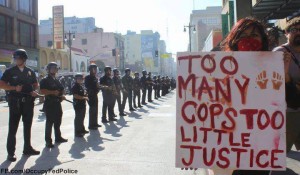Cops refuse to acknowledge their mistakes. Here’s why.
“In many departments, officers have developed a pathological aversion to ‘second-guessing.’ There is a pervasive belief that scrutinizing officer’s use-of-force decisions will lead officers to hesitate, exposing them to dangers that swift action might have averted. The result is a reluctance to engage in an in-depth, critical review of incidents in which an officer injures or kills a civilian and resentment when an outsider calls for such a review.”
The result is American policing has drifted into a mentality of “we’re right even when we’re wrong.” This creates additional problems beyond excessive force and police killings of civilians. For example,
“In California, the Peace Officer Standards and Training Commission has used a series of PSAs to encourage officers to have what it calls ‘courageous conversations’ about officers’ driving habits, seatbelt use, speeding, and fatigue. The goal is to reduce the number of officers injured or killed in crashes.”
And the number of civilians injured or killed by police vehicles, they could have added, although civilian life and limb seems to have a lower priority than officer safety in current police culture (more about this below). Another problem area is cops who escalate encounters with citizens:
“Telling a fellow officer that they created a needless confrontation with a suspect by using an inappropriately hostile tone or that they put themselves into an avoidable use-of-force situation with unnecessarily aggressive tactics may be … very difficult.”
 Also, cops who think they’re above criticism, and enjoy the backing of the system (their superiors, fellow officers, police unions, and courts), are more likely to lie in reports, plant evidence, and give perjured testimony, to justify their actions. For example, a Seattle cop who arrested an elderly black man for using a golf club as a walking stick likely would have gotten away with claiming he assaulted her by swinging the golf club at her, if her squad car dashcam video hadn’t proved she was lying. (The cop lost her job, but it took Seattle’s new reformer police chief a year to fire her.) Cases like this have shown many civilians that using a dash cam of their own may be a smart move when dealing with certain officers of the law.
Also, cops who think they’re above criticism, and enjoy the backing of the system (their superiors, fellow officers, police unions, and courts), are more likely to lie in reports, plant evidence, and give perjured testimony, to justify their actions. For example, a Seattle cop who arrested an elderly black man for using a golf club as a walking stick likely would have gotten away with claiming he assaulted her by swinging the golf club at her, if her squad car dashcam video hadn’t proved she was lying. (The cop lost her job, but it took Seattle’s new reformer police chief a year to fire her.) Cases like this have shown many civilians that using a dash cam of their own may be a smart move when dealing with certain officers of the law.
 Now let’s talk about officer safety. None of us want cops to be killed or hurt on the job. It can happen due to the nature of the work; policing is a dangerous job. Everything reasonably possible should be done to ensure officer safety, but that doesn’t justify excessive force, unnecessary force, or rampant police violence against citizens. Officer safety mustn’t be achieved by sacrificing citizens’ safety and rights. That undercuts the legitimacy of the police, and is contrary to their fundamental mission.
Now let’s talk about officer safety. None of us want cops to be killed or hurt on the job. It can happen due to the nature of the work; policing is a dangerous job. Everything reasonably possible should be done to ensure officer safety, but that doesn’t justify excessive force, unnecessary force, or rampant police violence against citizens. Officer safety mustn’t be achieved by sacrificing citizens’ safety and rights. That undercuts the legitimacy of the police, and is contrary to their fundamental mission.
Read the story here.